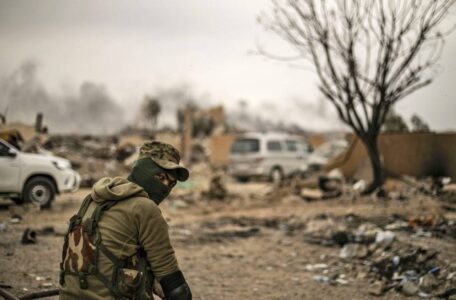
US general McKenzie: Islamic State in Iraq and Syria still long-term threat
Although the Islamic State extremist group is battered and scattered, it cannot be fully defeated until the world finds a way to reconcile and resettle the thousands of people displaced by years of war in Iraq and Syria, the general overseeing American military operations in the Mideast said on Thursday (US time).
Marine General Frank McKenzie, commander of US Central Command, said there is no military means of solving the problem of Mideast refugees and internally displaced persons, or IDPs, who await repatriation or resettlement and represent what he called an unfortunate byproduct of armed conflicts.
“Today, across vast swaths of Syria and Iraq, the systemic indoctrination of IDP and refugee camp populations who are hostage to the receipt of IS ideology is an alarming development with potentially generational implications,” McKenzie said in remarks to the National Council on US-Arab Relations.
He said a solution must come from a joint effort by diplomatic, security and humanitarian organisations.
“Unless the international community finds a way to repatriate, reintegrate into home communities, and support locally grown reconciliation programming of these people … we are buying ourselves a strategic problem 10 years down the road when these children grow up radicalised. If we don’t address this now, we’re never really going to defeat IS,” he added.
Over the past six years, starting with former President Barack Obama’s decision in 2014 to return US troops to Iraq to halt an advance of Islamic State forces into Iraq from Syria, the US has led an effort to militarily defeat the extremist group in both countries. But the group has not been extinguished, and McKenzie said it has not abandoned its aspiration to recreate a caliphate and attack the West.
President Donald Trump has pushed for a full US withdrawal from Syria, saying the conflict there was not worth US sacrifices, although there currently are at least several hundred US troops there working with local forces to solidify gains against IS. The US also has about 3000 troops still in Iraq; on Tuesday the Pentagon announced that Trump had ordered a drawdown to 2500 in Iraq with no change for Syria.
Representative Liz Cheney, a Wyoming Republican, said Trump was in danger of repeating Obama’s mistake of pulling out of Iraq in 2011 shortly after defeating al-Qaida there, a move she said led to the rise of the Islamic State.
“Decisions about troop levels should be made based on conditions on the ground not political timetables in Washington,” Cheney said. “Cutting troop levels in Afghanistan to 2500 puts at risk our efforts to prevent terrorists from establishing safe havens from which they could again attack the United States.”
Another Republican, Senator Lisa Murkowski of Alaska, called it troubling that Trump acted during the transition to a new president. She urged a “pause” in major shifts in the US military posture globally.
Source: NZ Herald





